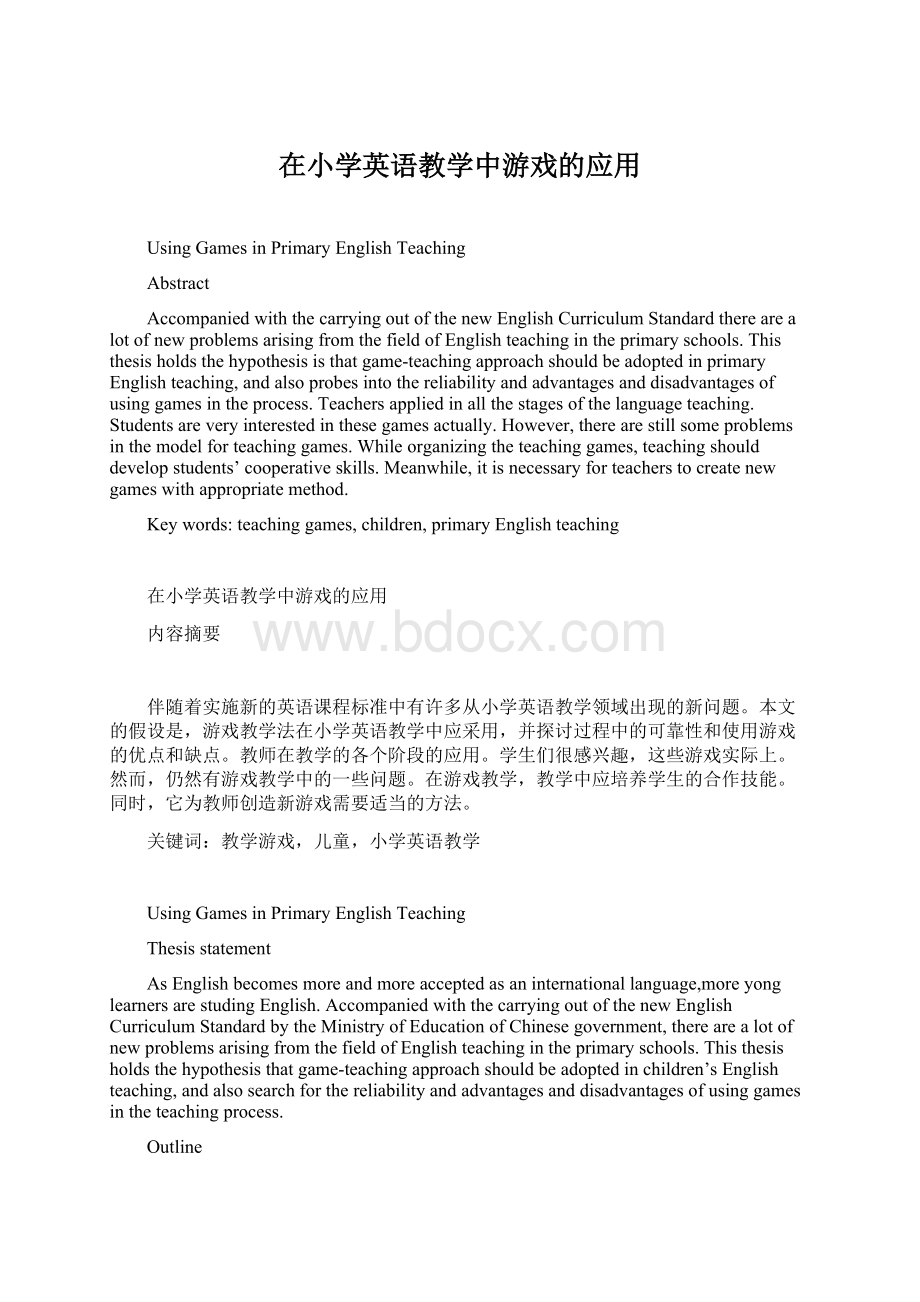在小学英语教学中游戏的应用.docx
《在小学英语教学中游戏的应用.docx》由会员分享,可在线阅读,更多相关《在小学英语教学中游戏的应用.docx(8页珍藏版)》请在冰豆网上搜索。

在小学英语教学中游戏的应用
UsingGamesinPrimaryEnglishTeaching
Abstract
AccompaniedwiththecarryingoutofthenewEnglishCurriculumStandardtherearealotofnewproblemsarisingfromthefieldofEnglishteachingintheprimaryschools.Thisthesisholdsthehypothesisisthatgame-teachingapproachshouldbeadoptedinprimaryEnglishteaching,andalsoprobesintothereliabilityandadvantagesanddisadvantagesofusinggamesintheprocess.Teachersappliedinallthestagesofthelanguageteaching.Studentsareveryinterestedinthesegamesactually.However,therearestillsomeproblemsinthemodelforteachinggames.Whileorganizingtheteachinggames,teachingshoulddevelopstudents’cooperativeskills.Meanwhile,itisnecessaryforteacherstocreatenewgameswithappropriatemethod.
Keywords:
teachinggames,children,primaryEnglishteaching
在小学英语教学中游戏的应用
内容摘要
伴随着实施新的英语课程标准中有许多从小学英语教学领域出现的新问题。
本文的假设是,游戏教学法在小学英语教学中应采用,并探讨过程中的可靠性和使用游戏的优点和缺点。
教师在教学的各个阶段的应用。
学生们很感兴趣,这些游戏实际上。
然而,仍然有游戏教学中的一些问题。
在游戏教学,教学中应培养学生的合作技能。
同时,它为教师创造新游戏需要适当的方法。
关键词:
教学游戏,儿童,小学英语教学
UsingGamesinPrimaryEnglishTeaching
Thesisstatement
AsEnglishbecomesmoreandmoreacceptedasaninternationallanguage,moreyonglearnersarestudingEnglish.AccompaniedwiththecarryingoutofthenewEnglishCurriculumStandardbytheMinistryofEducationofChinesegovernment,therearealotofnewproblemsarisingfromthefieldofEnglishteachingintheprimaryschools.Thisthesisholdsthehypothesisthatgame-teachingapproachshouldbeadoptedinchildren’sEnglishteaching,andalsosearchforthereliabilityandadvantagesanddisadvantagesofusinggamesintheteachingprocess.
Outline
I.Conceptoftheteachinggames
A.Definitionoftheteachinggames
B.Necessityoftheteachinggames
II.Organization
A.Typesofgames
B.Characteristicsofgames
C.Activitiesorganizationinteaching
III.Conclusion
UsingGamesinPrimaryEnglishTeaching
Ⅰ.OverviewoftheTeachingGame
Gamesareadifferentkindofplayactivity.Theyarehighlystructuredandincludespecificrulestobefollowed(SpodekBernardandSarachoOlivia,1994,p.132).Specially,teachinggameisoneofthekindsofthegames.Byrne(1995)gavethedefinitiontogamesasaformofplaygovernedbyrules.Hesuggested:
“Gamesshouldbeenjoyedandfun.Theyarenotjustadiversion,abreakfromroutineactivities,butawayofgettingthelearnertousethelanguageinthecourseofthegame.”(Byrne,1995,p.32).
AsSarahPhillips(1993:
16)inYoungLearnersclaimsthatiftheactivityisinteresting,itiseasiertoberemembered,andsoisthelanguage.Meanwhile,thechildrengainthesatisfactionwhichcanarousetheirmotivationoflearning.Therefore,tocreatearelaxedandenjoyableatmosphereforlanguageteachingishelpful.Thereisasurvey(TangLei,2004:
21)of77pupilsabouttheirattitudetotheEnglishteaching.96.01%pupilsrespondthattheyliketoplaygamesinEnglishclass;88.31%pupilsthinktheycanfocusagreatattentiontothegames;93.51%pupilslikethecooperativegames.Moreover,thesurveyshowsthatcompetitiveactivitiessharemorecommendsthantheothers.
A.Definitionoftheteachinggames
Fromtheabove,wecansafelydrawnaconclusionthat“game”inlanguageteaching(teachinggame)canbedefinedasanorganizedactivitythatusuallyhasthefollowingproperties:
A.aparticulartaskorobjective;B.asetofrules;C.competitionbetweenplayers;D.communicationbetweenplayersbyspokenorwrittenlanguage.
Thereisawidely-heldlaybeliefthatyoungersecondlanguagelearnersgenerallydobetterthanolderlearners.Childrenexerciseagooddealofbothcognitiveandaffectiveeffortinordertointernalizebothnativeandsecondlanguages.Moreover,oneofmostessentialthingthatteachersteachingchildren’sEnglishshouldmakeallmeanstomotivatetheirspiritandsustaintheirinterestinlearningEnglish.Therefore,mostofthoseteacherschosethemethodbyusinggamesintheteachingprocess,becausegamesusingiscloselyrelatedtocharacteristicsofchildrenfortheirageandtheirfeaturesofpsychology.However,justasweknow,languagelearningisnoteasywork.Inaword,gamescanhelpandencouragemanylearnerstosustaintheirinterestandtheyplayanimportantroleinlanguageteaching:
AnadvantageofusinggamesinEnglishclassroomisthattheyaddvariationtoalessonandincreasemotivationbyprovidingaplausibleincentivetousethetargetlanguage.Formanychildrenbetweenfourandtwelveyearsold,especiallytheyoungest,languagelearningwillnotbethekeymotivationalfactor.Gamescanprovidethisstimulus.Thegamecontextmakestheforeignlanguageimmediatelyusefultothechildren.Itbringsthetargetlanguagetolife.Throughplayinggames,studentscanlearnEnglishthewaychildrenlearntheirmothertonguewithoutbeingawaretheyarestudying;thuswithoutstress,theycanlearnalot.Evenshystudentscanparticipatepositively.(Lewis,1999)PlayinggamesinlearningmaydevelopthesenseofcommunicationinEnglishofthestudents.Andthecombinationofthegamesmayhelpthemwithastrongcommunicativeability.
Gameisnotonlythemosteffectivemeanstoarousethestudents’interestoflearning;italsocanmakethemallfullyconcentrateonwhattheyaredoing.Therefore,studentswillgetdeepimpressionofwhattheyhavelearnedandgainpermanentmemoryofthecontent.Becauseofthis,teacherscangetthebesteffectofoutcome.Teachinggamesarevarious.Teacherscanusesomenewgameseverytime.Thenthestudentswillbeofanexpectedandnewsenseinclass.Andtheywilloftenbeenthusiasticandneverfeeltires.Whileplayinggames,studentscanmakeagooduseoftheircomprehension,theirabilityofanalyses,judgment,imaginationandlogicaldeduction.Atthesametime,itrequiresthattheyhaveaquickmind,flexibilityandcreativity.Therefore,gamescannotonlyhelpstudentsmasterthelanguagepoints,butalsobegoodfordevelopingtheirintelligenceandallkindsofskills.
B.Necessityoftheteachinggames
Ithasbeenfoundthatoneappropriatestrategytoencouragelanguageacquisitionisusinglanguagegames.Childrenhaveagreaterneedtobemotivatedbytheteacherorthematerial,andtheyareeasiertobemotivated.Manyscholarsagreethatgamesinthelanguageclassroomhavebeenconsideredabetterwaytoarousetheinterestofchildren,JohnDeweyclaimedgameswereintegraltoschoolingsincetheyprovidedactiveandpositionlearningexperience.GamesarealsolistedinthelanguageskillsforthelearningstageofprimaryschoolintheNewEnglishCurriculumStandard.Whenusinggamesintheclassroom,itisbeneficialforteacherstohaveacompleteunderstandingofthedefinitionsofgames:
aformofplayconcerningrules,competition,andanelementoffun.Teachersshouldalsoconsidertheadvantagesofgames:
theabilitytocapturestudents’attention;lowerstudents’stress;andgivestudentsthechanceforrealcommunication.(CampellLinda,CampellBruceandDicksondee,1999).
Foradultsandchildren,differencebetweentheagegroupinlearningstyles,abilitiesandmotivationentailcorrespondingdifferencesinselectionofmaterialsandmethodologyandinlessonplan.Childrenhaveagreaterimmediateneedtobemotivatedbytheteacherorthematerialinordertolearneffectively.Teachercanraisechildren’smotivationandenthusiasmbyselectinginterestingactivities.Theyarealwayscuriousabouttheinterestingthings.GamesareoneexcellentmeanstomaintainthecuriosityintheEnglishcourse.Whentheteachersaskthechildrentoplaygames,theyarepreparedtoenjoy.AllthismeanthatitiseasytomaintainahighdegreeofmotivationandtomaketheEnglishclassintoanenjoyableandstimulatingexperienceforthechildren.
TosuccessfullyteachchildrenEnglishrequiresspecificskillsandintuitionsthatdifferfromthosethatateacherwoulduseforadultteaching.Brown(1994)suggestedfivecategorieshelptheteachertogivesomepracticalapproachestoteachingchildrenasfollows:
Thefirstoneisintellectualdevelopment.Sincechildren(uptotheageofabouteleven)arestillinanintellectualstageofwhatPiagetcalled“concreteoperations,”weshouldremembertheirlimitations.Rules,explanations,andotherevenslightlyabstracttalkaboutlanguagemustbeapproachedwithextremecaution.Play(game)isawayofmanipulatingtheoutsideworldsothatitservesavitalfunctioninthechild’sdevelopingintellectandremains.
Thesecondoneisattentionspan.Oneofthemostsalientdifferencesbetweenadultsandchildrenisattentionspan.Childrenhaveshortattentionspans.Theshortattentionspanscomeuponlywhentheteacherspresentstuffthattothemisboring,useless,ortoodifficult.Sincelanguagelessonscanattimesbedifficultforchildren,theteachersshouldtrytomaketheminteresting,lively,andfun.
Thethirdoneissensoryinput.Childrenneedtohaveallfivesensestimulated.Theactivitiesshouldstrivetogowellbeyondthevisualandauditorymodesthatweusuallyfeelaresufficientforaclassroom.Asitismentionedabove,gamesusebothvisualandauralchannelstoactivatethelanguageproduction.
Thefourthoneisaffectivefactors.Childrenareofteninnovativeinlanguageformsbutstillhaveagreatmanyinhibitions.Theyareextremelysensitive,especiallytopeers:
Whatdoothersthinkofme?
Whatwillso-and-sothinkwhenIspeakinEnglish?
Childrenareinmanywaysmuchmorefragilethanadults.Theiregosarestillbeingshaped,andthereforetheslightestnuancesofcommunicationcanbenegativelyinterpreted.Teachersneedtohelpthemtoovercomesuchpotentialbar